Our Library
Explore our publications, from research papers and series to educational materials, covering all aspects of conflict transformation and peace promotion.
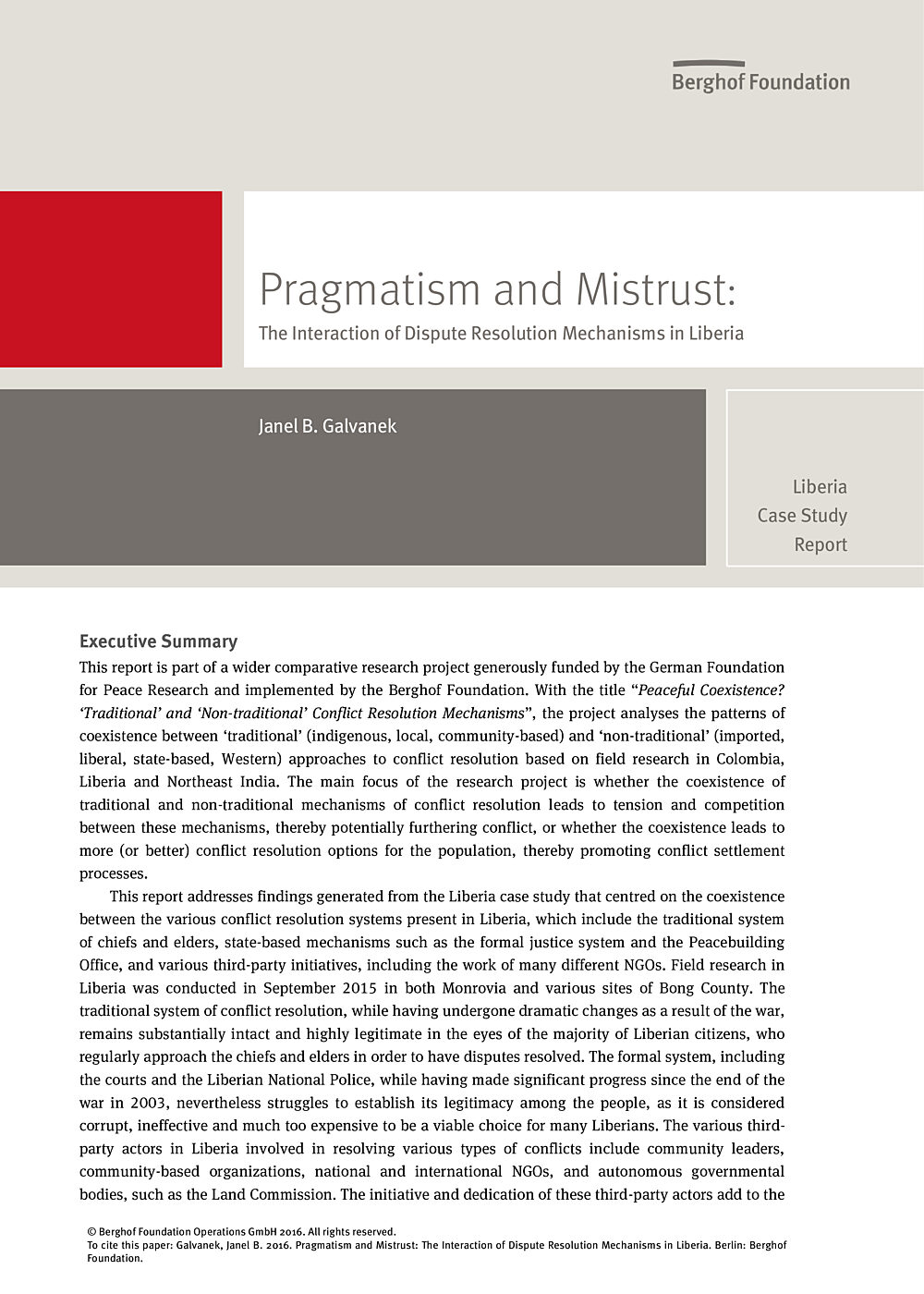
Pragmatism and MistrustThe Interaction of Dispute Resolution Mechanisms in Liberia (Case Study)
This report addresses findings generated from the Liberia case study on the coexistence of various conflict resolution systems in Liberia. Besides the traditional system of chiefs and elders, there are state-based mechanisms such as the formal justice system and the Peacebuilding Office, and various third-party initiatives, including the work of many different NGOs.
The study comes to the conclusion that the interaction and even cooperation of conflict resolution mechanisms in Liberia is happening on a massive scale, and provides recommendations on how this cooperation could be significantly improved.
- Year2016
- Author(s)Janel B. Galvanek
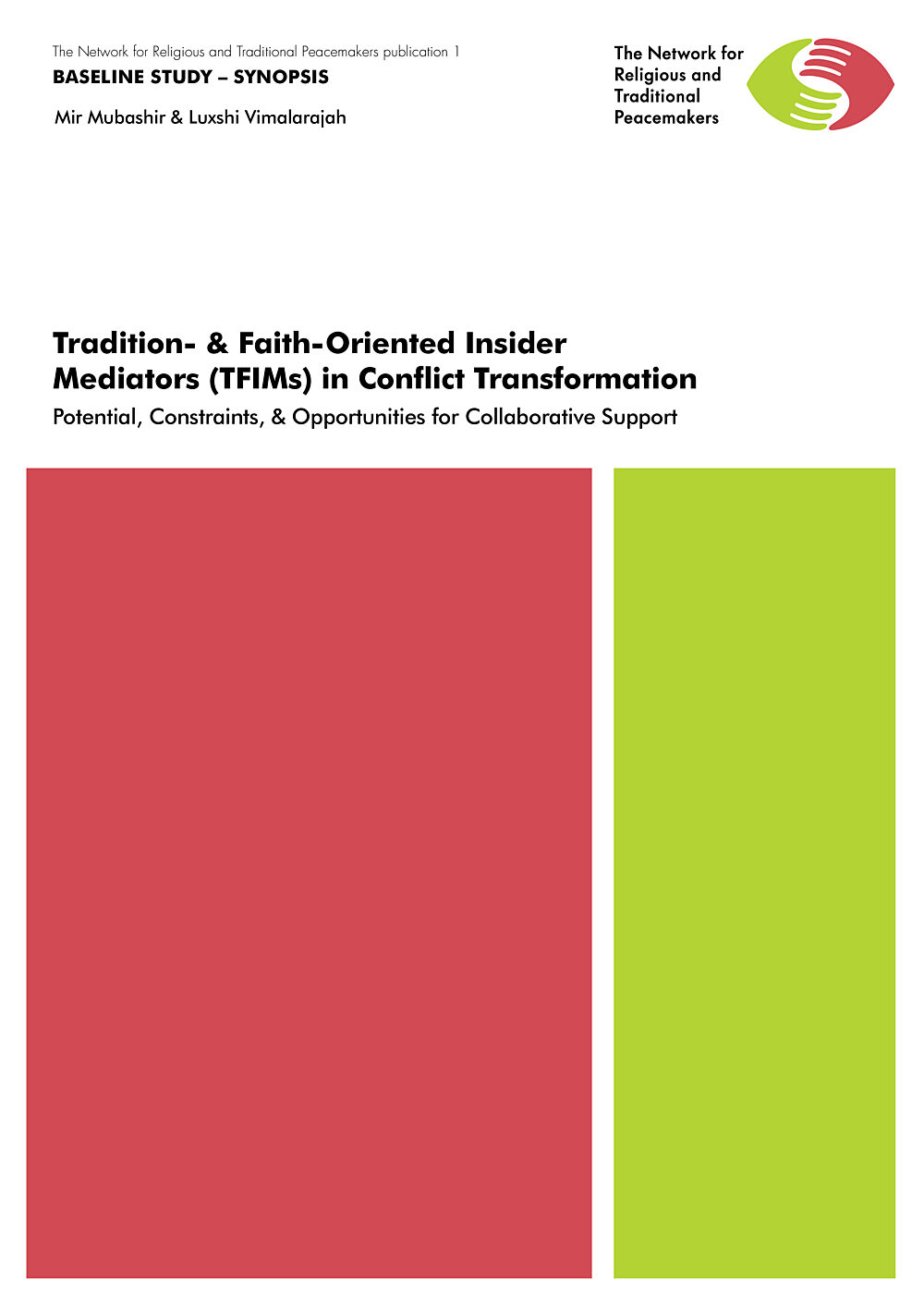
Tradition- & Faith-Oriented Insider Mediators (TFIMs) in Conflict TransformationPotential, Constraints, & Opportunities for Collaborative Support (Baseline Study: Synopsis)
On the basis of empirical knowledge acquired through case studies in Myanmar (Burma), Southern Thailand, Lebanon, Colombia, Kenya and Mali, this study conceptualises and contextualises a specific set of religious and traditional peacemakers as tradition- & faith-oriented insider mediators (TFIMs). In considering their peace mediation roles, potential and the constraints under which they work, it also reflects on the opportunities for collaborative support linking various actors within conflict contexts.
- Year2016
- Author(s)Mir Mubashir, Luxshi Vimalarajah
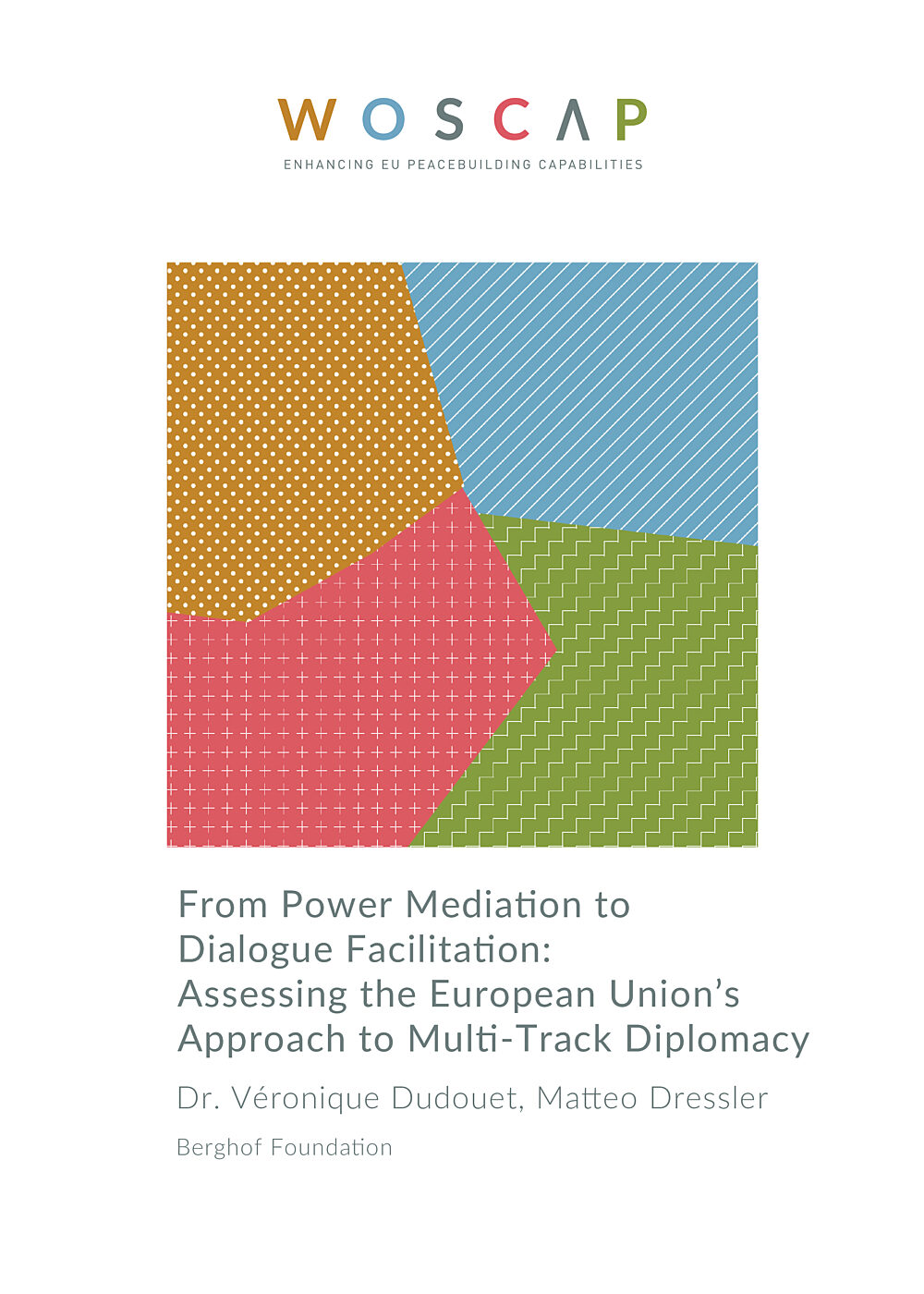
From Power Mediation to Dialogue FacilitationAssessing the European Union’s Approach to Multi-Track Diplomacy (Scoping Study)
This scoping report defines multi-track diplomacy (MTD) as a specific approach to EU foreign policy, alongside other intervention strategies such as security sector intervention, political reform support or socio-economic assistance. It places a primary emphasis on diplomatic initiatives aimed at supporting conflict prevention and peacebuilding, especially during the various (formal and informal) stages of peace processes.
- Year2016
- Author(s)Véronique Dudouet, Matteo Dressler
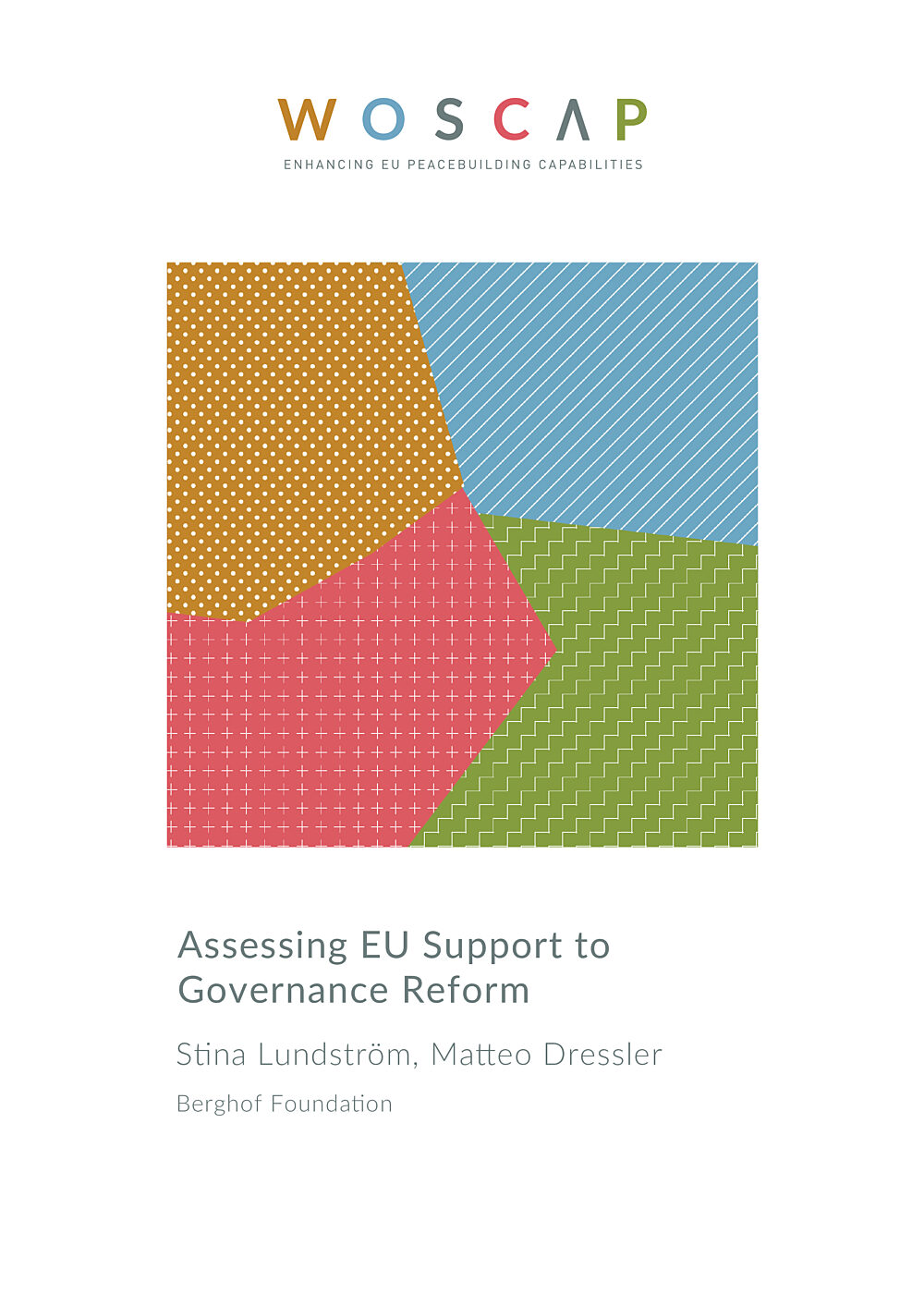
Assessing EU Support to Governance Reform(Scoping Study)
While the promotion of good governance has long been at the heart of EU’s assistance to peacebuilding, stability, and security, it has gained yet more prominence among the set of EU values upheld in the post-Lisbon EU (common) foreign policy agenda, closely associated – and sometimes used interchangeably – with related values such as human rights, democratisation, and the rule of law (Hout 2013).
- Year2016
- Author(s)Stina Lundström, Matteo Dressler
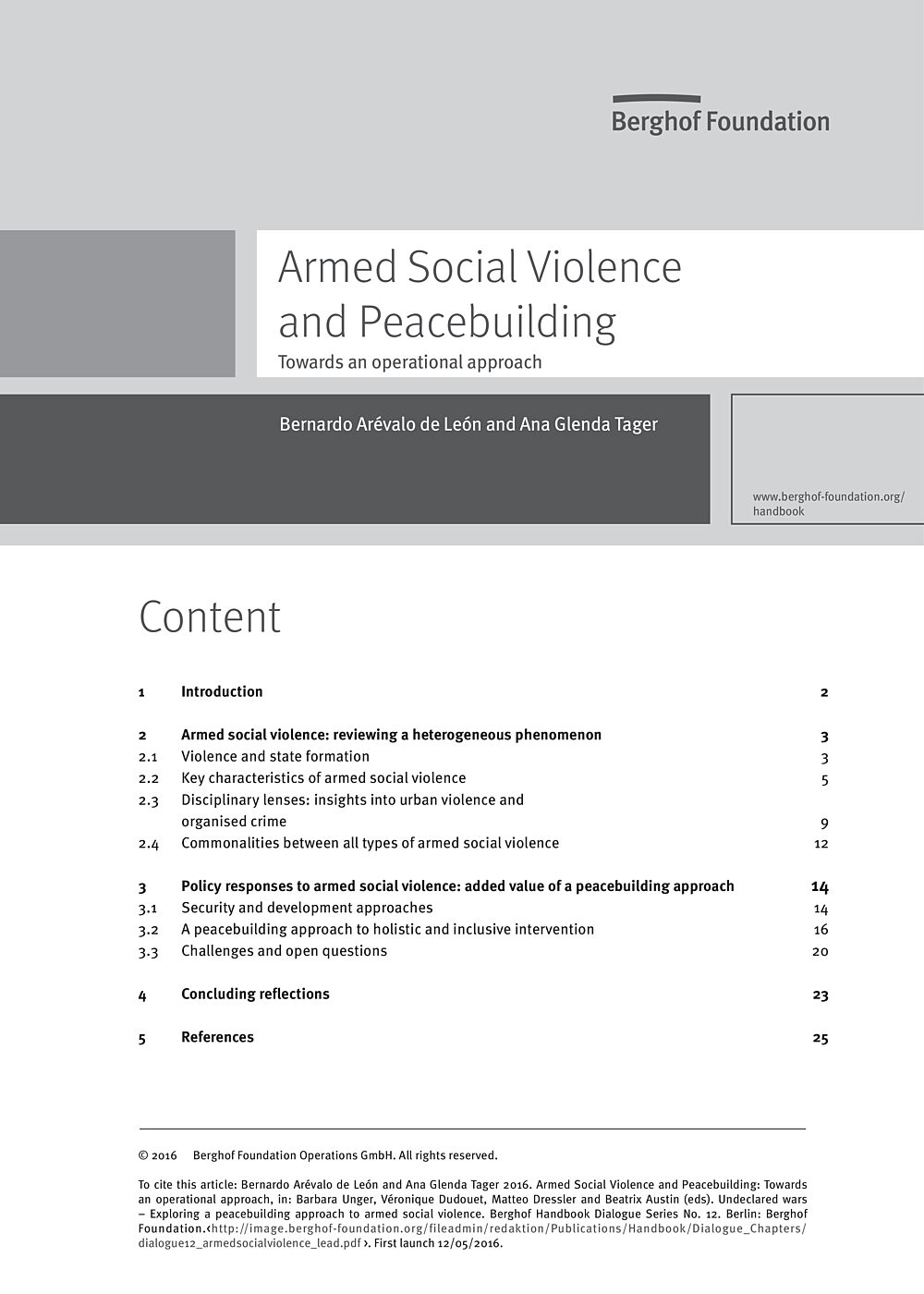
Armed Social Violence and Peacebuilding: Towards an operational approachBerghof Handbook Dialogue Series No. 12 - lead article
In some countries, more civilians are being killed by armed gangs and criminal organisations than in traditional combat. Still, these pockets of armed social violence – “Undeclared wars” marked, among other things, by criminal, gang and/or urban violence – have long received much less attention than politically motivated forms of armed conflicts. As their effects – social-political destabilisation, in some cases coinciding with high numbers of victims – are becoming more pressing, national and international actors have begun addressing the phenomenon.
- Year2016
- Author(s)Bernardo Arévalo de León, Ana Glenda Tager
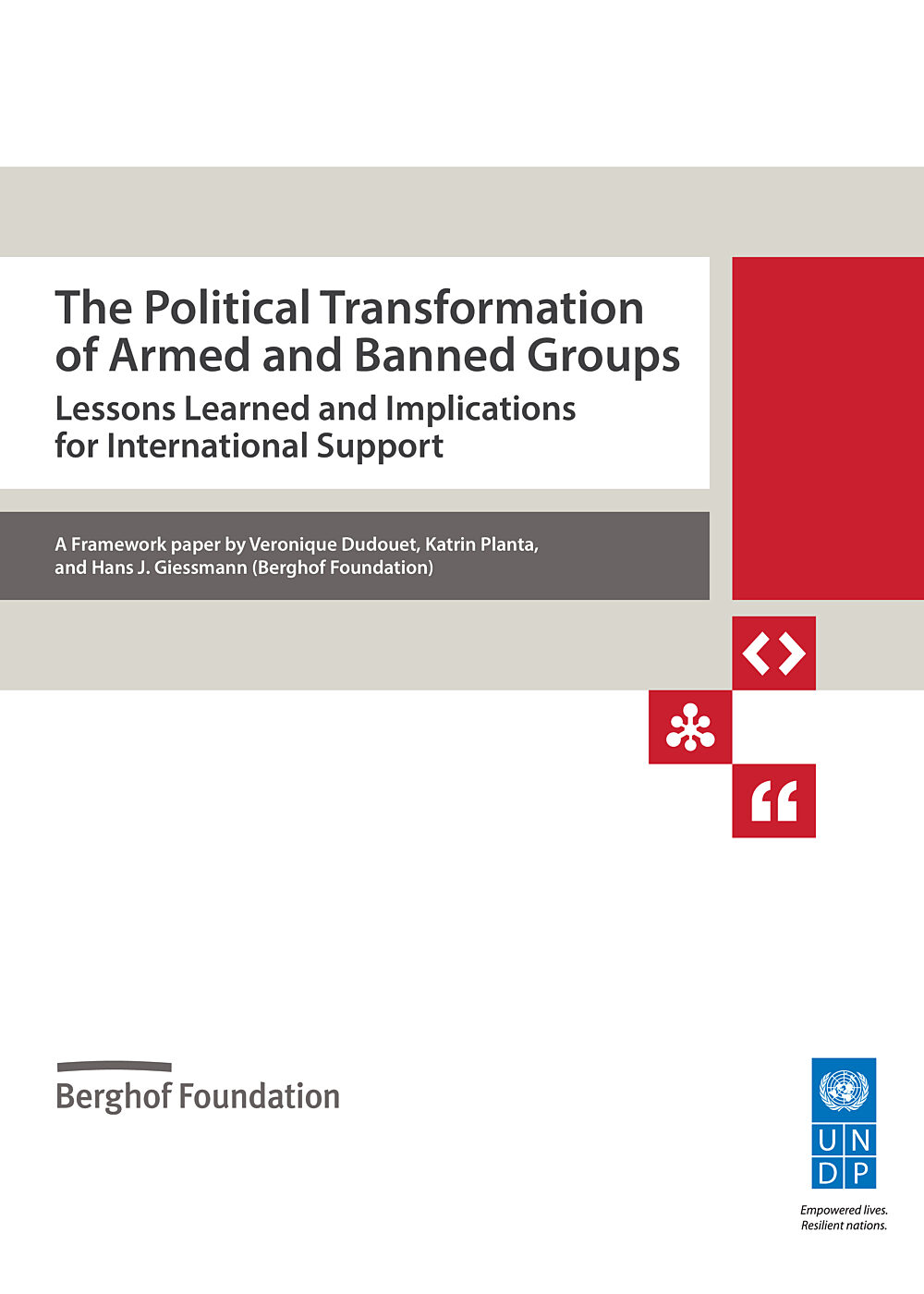
The Political Transformation of Armed and Banned GroupsLessons Learned and Implications for International Support
The paper provides key insight on the factors that might explain why some armed groups undergo effective transformations from engaging in war and violence to participating in peaceful political processes, while others fail to implement or consolidate their political project. Highlighting the critical role played by the UN system in these contexts, in particular peacekeeping and political missions, it argues that development actors operating globally, such as UNDP, are also well placed to bring a broad range of expertise and instruments when supporting these transformative processes. However, it underscores that enhancing inter-agency collaboration between UNDP and actors directly involved in political processes will be essential in supporting this work, citing the Joint UNDP-DPA Programme on Building National Capacities for Conflict Prevention as a particularly effective mechanism in this regard.
- Year2016
- Author(s)Véronique Dudouet, Katrin Planta, Hans-Joachim Giessmann
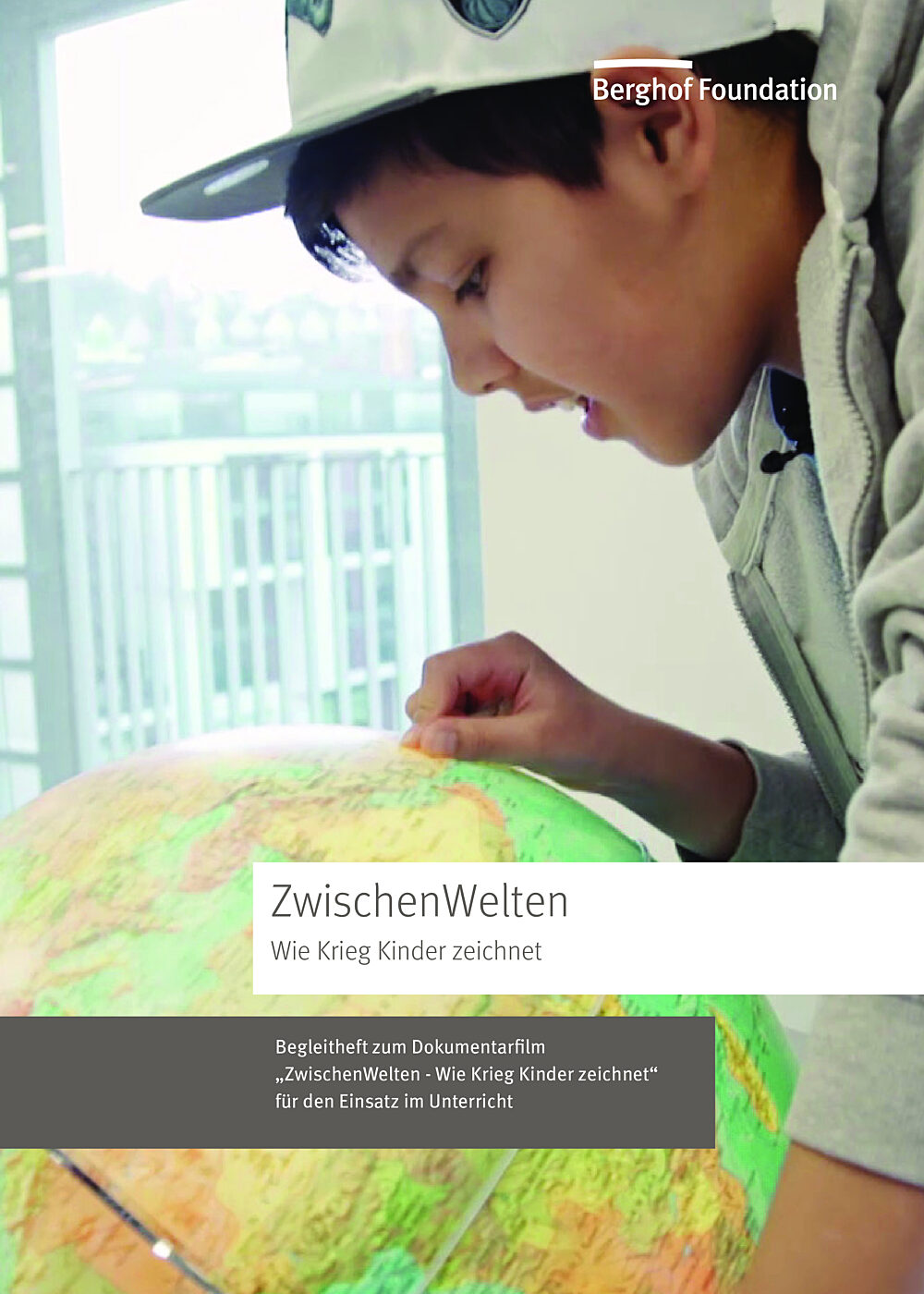
ZwischenWelten Begleitheft
Der Dokumentarfilm "ZwischenWelten - wie Krieg Kinder zeichnet" begleitet drei geflüchtete Kinder und Jugendliche bei ihrem Ankommen in Deutschland. In drei Kapiteln erzählen die Kinder ihre Geschichten und Erlebnisse im Krieg, auf ihrer Flucht und über ihr Leben in Deutschland. Auf Aussagen von Expertinnen und Experten wurde bewusst verzichtet, lediglich die Eltern und eine Lehrerin ordnen das Gesagte der Kinder an wenigen Stellen ein.
Zu dem Dokumentarfilm entstand im Dialog mit Lehrkräften ein Begleitheft, das aufzeigt, wie unterschiedliche Themen des Films Eingang in den Unterricht finden können. Durch seine Dreitteilung eignet sich der Film besonders gut, in kürzeren Abschnitten gezeigt und anschließend mit den Materialien in diesem Heft kombiniert zu werden.
- Year2016
- Author(s)Dagmar Nolden, Julia Oschinski, Nicole Rieber
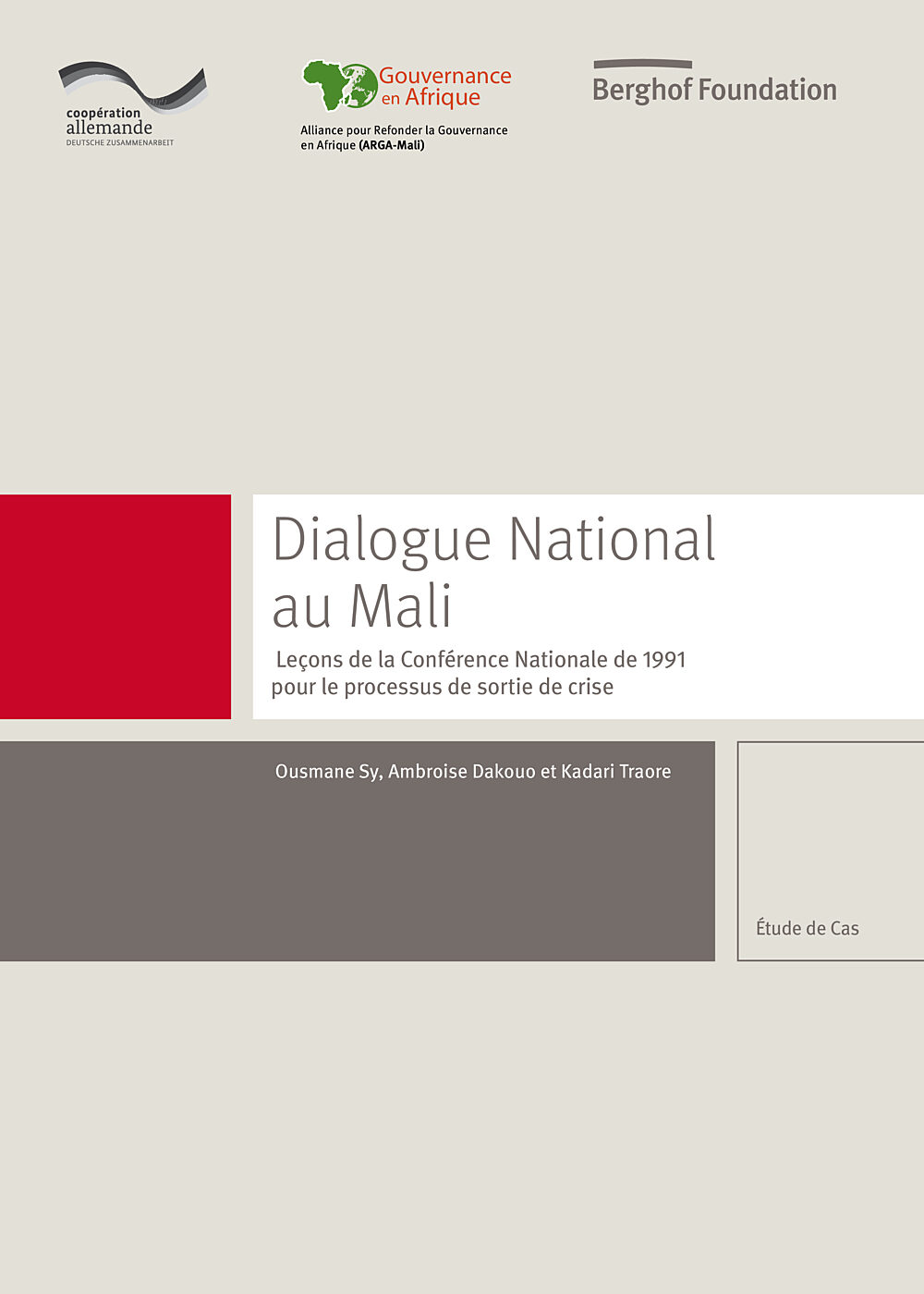
Dialogue National au MaliLeçons de la Conférence Nationale de 1991 pour le processus de sortie de crise (Manuel sur le Dialogue National. Étude de Cas)
Depuis de nombreuses années, la problématique du dialogue entre acteurs maliens se trouve au coeur des débats. En effet, la crise profonde qui a été révélée par les événements du 21 mars 2012 a ébranlé le tissu social et le vivre ensemble et fragilisé l’Etat et ses institutions. Le Dialogue National est alors réapparu comme une nécessité absolue afin de permettre à tous les enfants de la nation de se retrouver et se concerter sur le nouveau contrat social qui doit lier les maliennes et les maliens.
- Year2016
- Author(s)Ousmane Sy, Ambroise Dakouo, Kadari Traoré
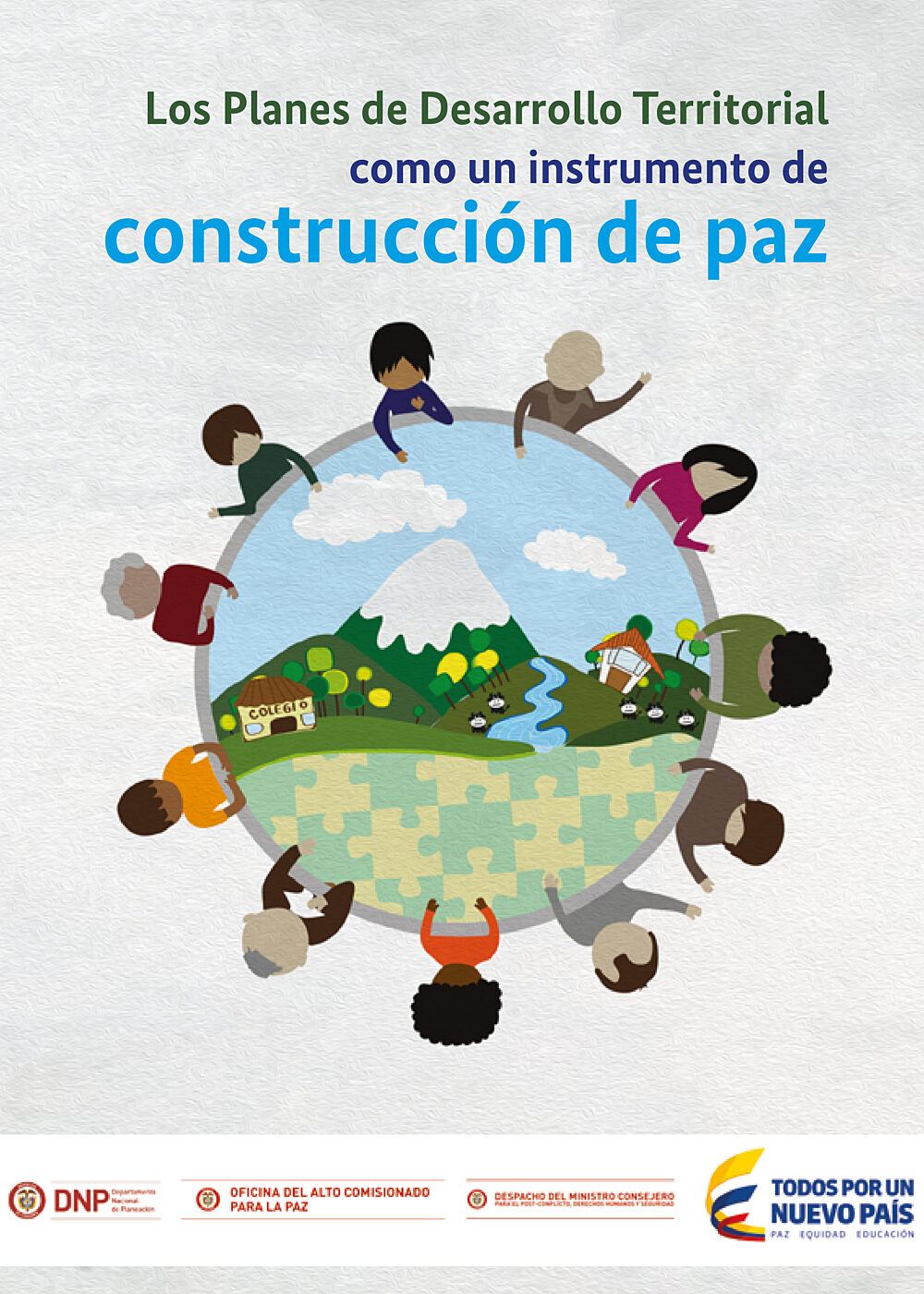
Los Planes de Desarrollo Territorial
El presente documento de lineamientos metodológicos se realizó en el marco de la Estrategia de incidencia para la incorporación de la Construcción de Paz en los Planes de Desarrollo Territorial (PDT), liderada por la mesa técnica interinstitucional compuesta por la Oficina del Alto Comisionado para la Paz (OACP); el Despacho del Ministro Consejero para el Posconflicto, los Derechos Humanos y la Seguridad; y el Departamento Nacional de Planeación (DNP). Esta estrategia tiene como objetivo generar herramientas e instrumentos que puedan ser adoptados a las particularidades del territorio, para que los entes territoriales incluyan de manera transversal temas y tareas claves concernientes a la paz en sus PDT y en otros instrumentos de planificación. De igual forma, pretende posicionar la paz como un propósito de toda la población nacional.
- Year2016
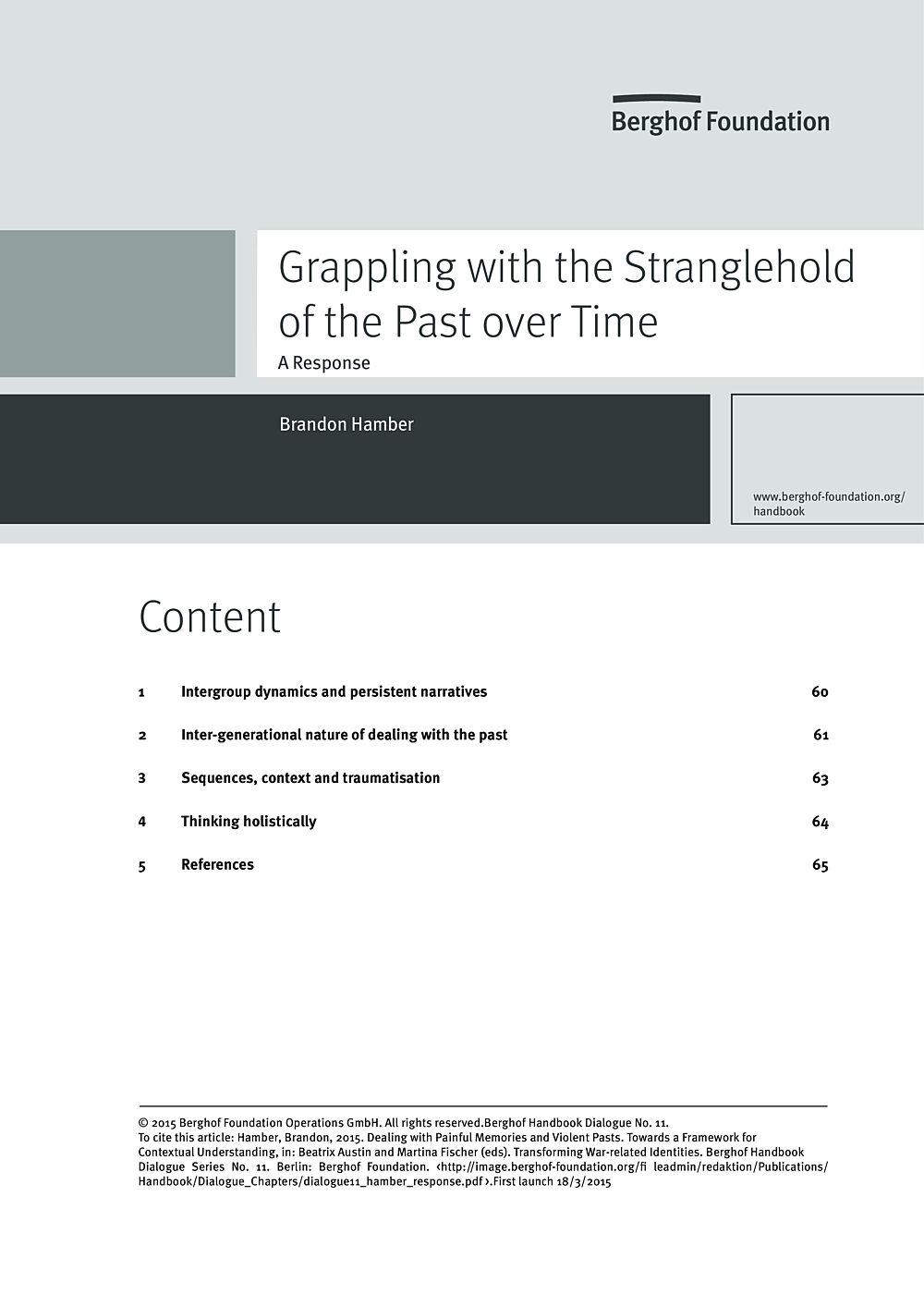
Grappling with the Stranglehold of the Past over Time: A ResponseBerghof Handbook Dialogue Series No. 11 - final reflection
I cannot do justice to the rich and thoughtful comments on my essay “Dealing with Painful Memories and Violent Pasts: Towards a Framework for Contextual Understanding” in this short response. The respondents who so graciously shared their thoughts have provided much to consider; I can only touch on the implications. I will not dwell on the commonalities in the approaches put forward by the commentators and myself, but rather focus on the divergences or elaborations posed by their insightful comments.
- Year2016
- Author(s)Brandon Hamber